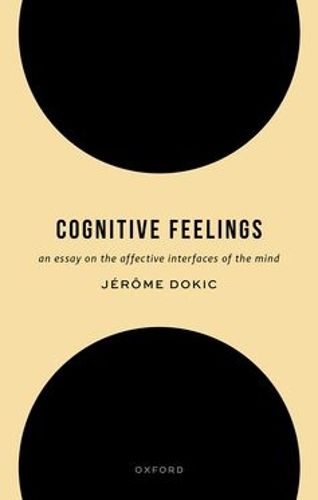Readings Newsletter
Become a Readings Member to make your shopping experience even easier.
Sign in or sign up for free!
You’re not far away from qualifying for FREE standard shipping within Australia
You’ve qualified for FREE standard shipping within Australia
The cart is loading…






This book proposes a comprehensive theory of cognitive feelings, also referred to as 'noetic', 'epistemic', or 'metacognitive' feelings. There are pivotal moments in our mental lives when, even before we have explicitly thought or reflected on the matter, we become aware of our own epistemic relationship with the world and the extent to which we can exert control over it. The book analyses these moments and the subjective experiences involved, which can be fleeting or more lasting. These experiences are cognitive feelings, such as feelings of familiarity, knowing, confidence, rightness, understanding, certainty, presence, and reality and, on the negative side, feelings of unfamiliarity or strangeness, not knowing, wrongness, perplexity, doubt, uncertainty, absence, and unreality. Some cognitive feelings have evocative names, such as the tip-of-the-tongue experience, the 'aha' moment, or the 'eureka' effect. The set of cognitive feelings has fuzzy boundaries, and shares similarities with other experiences, such as surprise, curiosity, and interest, but also with intuitions, hunches, or presentiments.
The book puts forward a unified account of cognitive feelings as genuine affective experiences that play a constitutive role in the geography and economy of the mind at the interfaces between perception, memory, imagination, belief, and action. Like ordinary emotions, cognitive feelings have both an evaluative and a motivational dimension. Specifically, they are based on monitoring features of our epistemic situation and generate action tendencies aimed at improving it. The book also presents detailed applications of this account to two main types of cognitive feelings, namely feelings of reality and familiarity. It examines the role of these feelings in various domains such as virtual reality, aesthetic experiences, and self-transcendent experiences (i.e., experiences in which the apparent boundaries between the self and the external world are altered). The methodology is philosophical analysis informed by empirical studies in cognitive science.
$9.00 standard shipping within Australia
FREE standard shipping within Australia for orders over $100.00
Express & International shipping calculated at checkout
This book proposes a comprehensive theory of cognitive feelings, also referred to as 'noetic', 'epistemic', or 'metacognitive' feelings. There are pivotal moments in our mental lives when, even before we have explicitly thought or reflected on the matter, we become aware of our own epistemic relationship with the world and the extent to which we can exert control over it. The book analyses these moments and the subjective experiences involved, which can be fleeting or more lasting. These experiences are cognitive feelings, such as feelings of familiarity, knowing, confidence, rightness, understanding, certainty, presence, and reality and, on the negative side, feelings of unfamiliarity or strangeness, not knowing, wrongness, perplexity, doubt, uncertainty, absence, and unreality. Some cognitive feelings have evocative names, such as the tip-of-the-tongue experience, the 'aha' moment, or the 'eureka' effect. The set of cognitive feelings has fuzzy boundaries, and shares similarities with other experiences, such as surprise, curiosity, and interest, but also with intuitions, hunches, or presentiments.
The book puts forward a unified account of cognitive feelings as genuine affective experiences that play a constitutive role in the geography and economy of the mind at the interfaces between perception, memory, imagination, belief, and action. Like ordinary emotions, cognitive feelings have both an evaluative and a motivational dimension. Specifically, they are based on monitoring features of our epistemic situation and generate action tendencies aimed at improving it. The book also presents detailed applications of this account to two main types of cognitive feelings, namely feelings of reality and familiarity. It examines the role of these feelings in various domains such as virtual reality, aesthetic experiences, and self-transcendent experiences (i.e., experiences in which the apparent boundaries between the self and the external world are altered). The methodology is philosophical analysis informed by empirical studies in cognitive science.